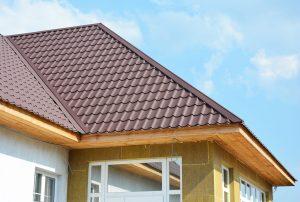
The roof is one of the most important parts of a building when it comes to energy efficiency. It can account for up to 30% of a home’s energy loss, so choosing the right roofing material can make a big difference in your energy bills.
There are a number of factors to consider when choosing an energy-efficient roofing material, including the climate you live in, the type of building you have, and your budget. Here is a look at some of the most popular energy-efficient roofing materials and their benefits.
Asphalt Shingles
Asphalt shingles are the most common type of roofing material in the United States. They are relatively inexpensive and easy to install, but they are not very energy-efficient. Asphalt shingles can absorb a lot of heat, which can lead to increased energy costs for cooling.
However, there are now a number of energy-efficient asphalt shingles on the market. These shingles are made with reflective materials that help to reduce heat absorption. They can also be made with insulation that helps to keep heat out of your home.
Metal Roofs
Metal roofs are becoming increasingly popular due to their energy efficiency and durability. Metal roofs are made from a variety of materials, including steel, aluminium, and copper. Stone-coated metal roofs like Eurotiles are highly reflective, which helps to keep heat out of your home. Metal roofs are also very durable and can last for many years.

READ ALSO: ROOFING MATERIALS IN GHANA: WHICH ONES ARE BEST FOR YOUR HOME OR CONSTRUCTION BUSINESS?
Tile Roofs
Tile roofs are another popular option for energy-efficient roofing. Tile roofs are made from clay or concrete and are very durable. They are also very reflective, which helps to keep heat out of your home. Tile roofs can be expensive, but they can last for many years.
Green Roofs
Green roofs are a relatively new type of roofing material that is becoming increasingly popular. Green roofs are made from plants that are grown on top of a roof. They provide a number of benefits, including energy efficiency, stormwater management, and improved air quality.
Green roofs can help to reduce heat absorption by up to 70%. They can also help to cool your home in the summer and insulate it in the winter. Green roofs can also help to reduce stormwater runoff by absorbing rainwater.
Solar Roofs
Solar roofs are a type of roofing material that is made with solar panels. Solar panels convert sunlight into electricity, which can be used to power your home. Solar roofs can help you to reduce your reliance on fossil fuels and save money on your energy bills.
Solar roofs can be expensive, but they can save you money in the long run. They can also increase the value of your home.
Choosing an Energy-Efficient Roofing Material
The best way to choose an energy-efficient roofing material is to consider your climate, the type of building you have, and your budget. If you live in a warm climate, you will want a roofing material that is reflective and helps to keep heat out of your home. If you live in a cold climate, you will want a roofing material that is insulated and helps to keep heat in your home.
Your budget will also be a factor in your decision. Asphalt shingles are the most affordable option, but they are not the most energy-efficient. Metal roofs and tile roofs are more expensive, but they are also more energy-efficient. Green roofs and solar roofs are the most expensive option, but they can offer the greatest energy savings.
No matter what type of roofing material you choose, make sure to get it installed by a qualified professional. This will ensure that your roof is installed properly and that it will last for many years.
READ ALSO: UNDERSTANDING ROOFING COSTS IN GHANA: FACTORS THAT AFFECT YOUR BUDGET
Benefits of Energy-Efficient Roofs
There are many benefits to choosing an energy-efficient roofing material. Some of the benefits include:
- Reduced energy costs: Energy-efficient roofs can help you to reduce your energy costs for cooling and heating.
- Increased comfort: Energy-efficient roofs can help to keep your home cooler in the summer and warmer in the winter, which can lead to increased comfort.
- Extended roof life: Energy-efficient roofs can help to extend the life of your roof by reducing the amount of wear and tear caused by heat and UV rays.
- Increased property value: Energy-efficient roofs can increase the value of your home.
- Environmental benefits: Energy-efficient roofs can help to reduce your carbon footprint by reducing your reliance on fossil fuels.

Conclusion
Choosing an energy-efficient roofing material is a great way to save money on your energy bills, increase your home’s comfort, and extend the life of your roof. There are many different energy-efficient roofing materials available, so you can choose one that fits your needs and budget. At Rosa Roofing Systems, we know that your roof is an important investment, and we’re committed to providing you with the best possible service. We’ll work with you to understand your needs and budget, and we’ll make sure that you’re happy with the final product.

